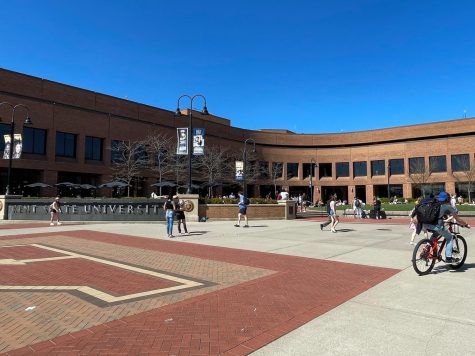National Black HIV/AIDS Awareness Day
February 6, 2009
Student groups work to educate Kent State
Almost 28 years since the first case of HIV was reported, the HIV/AIDS epidemic remains a major problem in America. Tomorrow, the nation will recognize National Black HIV/AIDS Awareness Day.
The awareness day was founded in 2001 in an effort to promote education and involvement about the disease among the African American community. At Kent State, the Office of Health Promotions and Face AIDS were two of the 1,500 organizations across the nation that participated.
| Related Sites |
“It feels good (to participate) because the majority of these people are my peers,” said Akua Gyau, senior integrated health studies major, who is a student assistant at the Office of Health Promotion. “It’s always good to help someone out or just try to educate your friends.”
The theme for this year’s initiative is “Black Life is Worth Saving,” referring to the value of every life, not just people infected with HIV.
“What we want to say is that whatever a person is, their life is worth saving,” said LaMont Evans, chief executive officer for Healthy Black Communities, the lead organization behind the initiative. “If we can prevent an infection (by) talking to people that are HIV negative then that would be great – if we can prevent someone who is positive from transmitting the disease that is just as great.”
Kent State organizations began their recognition of the day on Wednesday, when they provided information to students about the disease to help bring attention to the epidemic.
Junior biochemistry major Alexandra Hill, who is president of Kent State’s chapter of Face AIDS, said it’s important to raise awareness on an issue that affects the world.
“It’s very important, especially with a topic that can be seen as taboo, to realize what’s going on in the world and to know that you can have the ability to make a difference. I think that’s very important,” Hill said.
Hill said the organization’s goal is to make AIDS more personal because people don’t always know someone who has the disease. On Wednesday, the group sold bookmarks that raised money for patients in the Rwanda Health Clinic.
“By having these bookmarks that we have with pictures and the stories of people who make them, we’re trying to make it a more personal disease,” Hill said.
HIV/AIDS: What you need to know
In a study by the Center for Disease Control and Prevention, African Americans accounted for the largest share of new infections and contracted the disease 10 times the rate of their white counterparts.
According to the CDC, nearly 20,000 African Americans become infected with HIV every year and account for 49 percent of the population living with HIV. The CDC states the disease is prevalent among African Americans because of unprotected sex, injection drug use and the stigma about the disease.
“Some people still think (HIV) can only be passed between two homosexual men,” Hill said. “Another thing that is overlooked is the simplicity of stopping it – all you have to do is use protection, talk with your partner, get tested.”
Evans said it’s important for students and young adults to be pro-active in the fight against AIDS.
“The youth has to take the lead (in the fight),” Evans said. “There is a silent epidemic amongst the college campuses around the country, and sometimes we don’t find out until later.”
Evans said if abstinence isn’t possible, students need to use contraceptives or practice loyalty by having only one sexual partner.
Expanding awareness worldwide
Evans said the initiative will be celebrated in Cameroon, Nigeria, South Africa and Ghana this year.
After eight years of the initiative, Evans said he is encouraged with the growth over this period of time.
“Every year we have a new group of people who have just heard about the date, who are fired up about getting involved,” Evans said. “For us, we know it’s a gradual process – it’s keeping the fire burning in multiple communities so that (people) know the AIDS crisis is not over.”
Contact health reporter Nick Walton at [email protected]..























